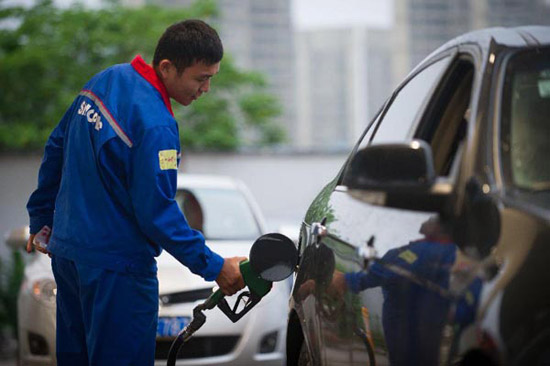
 |
| Photo taken on May 9 shows a worker filling up a car at a gas station in Hefei, capital of east China's Anhui Province. The retail price of both gasoline and diesel will be raised by 95 yuan (15.32 U.S. dollars) per tonne starting Friday, the National Development and Reform Commission (NDRC), the country's top economic planner, said Thursday. (Xinhua/Du Yu) |
BEIJING, May 9 (Xinhua) -- China will slightly hike gasoline and diesel prices starting Friday, the first increase since the fuel pricing scheme was reformed in March.
The retail price of both gasoline and diesel will be raised by 95 yuan (15.32 U.S. dollars) per tonne, the National Development and Reform Commission (NDRC), the country's top economic planner, said Thursday.
The benchmark retail price of gasoline will be increased by 0.07 yuan per liter and diesel by 0.08 yuan per liter.
As part of government efforts to promote market-oriented pricing for energy resources, the NDRC introduced in March a new pricing mechanism in the domestic market to better reflect global market changes.
It shortened the fuel price adjustment cycle to 10 working days from 22 working days, scrapped the four-percent floating band for oil price changes and adjusted the varieties of crude used to calculate price changes for domestic oil products.
Under the new pricing regime, domestic fuel prices will not be changed if global oil price changes are less than 50 yuan per tonne.
After the new scheme went into effect, the NDRC skipped the first adjustment window on April 10, as global price changes were less than 50 yuan. Two weeks later, it cut the price of gasoline by 0.29 yuan per liter and diesel by 0.34 yuan per liter to reflect declining international crude prices.
Friday's increase is the smallest in years, as global price changes have passed 50 yuan by a small margin.
Wang Zhen, a professor at the China University of Petroleum, said the recent adjustment indicates that the government is serious in implementing the reform and that it will obey market principles in future economic activities.
The more transparent new pricing system also helps curb speculation and hoarding, he said.
Previously, domestic fuel prices would be adjusted when prices for Brent, Dubai and Cinta crude oil changed by more than 4 percent over 22 working days.
The long observation period left domestic speculators room to stockpile to secure handsome profits, which caused big market fluctuations.
Shortening the adjustment cycle to 10 days makes single-day changes important to the final decision. Meanwhile, the new scheme did not specify the types of the benchmark crude, making it difficult for speculators to forecast future changes, said Zhang Kuikuan, general manager of the www.jkx.com.cn, a petrochemical information consultancy.
Fuel pricing has been strictly regulated in China as policymakers are very concerned about its impact on inflation in the world's most populous nation.
The National Bureau of Statistics said Thursday that China's Consumer Price Index, a main gauge of inflation, accelerated from a month earlier to grow 2.4 percent in April.
Because of its small scale, the latest price hike is not expected to push up inflation further, analysts said.
Gao Jian, an analyst with oil consulting website http://intl.sci99.com, predicted global crude prices would climb in the short run as economic recovery boosts demand.

















 S China city looks like Venice after heavy downpour
S China city looks like Venice after heavy downpour


![]()
